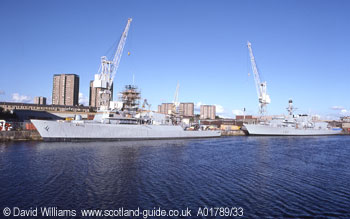The history of shipbuilding on the Clyde goes back to the time when the upper reaches of the river were deepened, allowing yards to develop on many parts of the river bank, including upstream of the city centre.
In 1811 Henry Bell built the Comet steamboat at Port Glasgow and in 1812 it could travel from Port Glasgow to Broomielaw in only three-and-a-half hours, thus ushering in the age of seagoing steamships. Its success encouraged yards to be built in many Clydeside towns and in 1834 Tod & MacGregor began to construct iron hulls, allowing bigger and more powerful ships to be made. Robert Napier, who had built the boiler for the Comet, then opened a yard at Govan, thus establishing himself as one of the most influential shipbuilders the Clyde has ever known. He invested in companies who bought his ships (for example, the forerunner of Cunard) thus beginning the important link between shipbuilders and shipowners. The development of the compound engine by John Elder further enhanced the reputation of the river`s yards as innovative builders and, in the 1860s, an incredible eighty per cent of the British tonnage was built on the Clyde.
This article is based on the guidebook "The Glasgow Guide".

Yarrows shipyard in the west of the city has a long history of building naval ships for many countries.